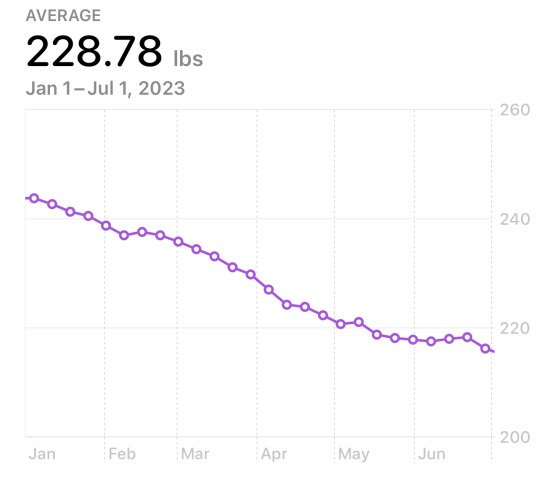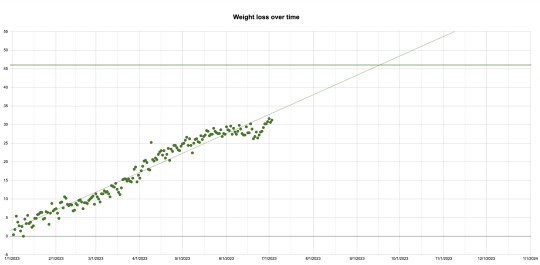Text
Krinn's report on trying higher levels of potassium supplementation and losing weight. This is a great N=1 self-experiment, if you're interested in this stuff, check it out!
An Ad-Hoc, Informally-Specified, Bug-Ridden, Single-Subject Study Of Weight Loss Via Potassium Supplementation And Exercise Without Dieting
Here's the short version: I lost 30 pounds in 6 months by chugging a bunch of potassium salt and exercising a lot. My subjective experience is that cranking my potassium intake way up made it possible to do a lot more exercise than I had been doing without also eating a lot more. Exercising more without also eating more led to weight loss (as one would hope!). I did not diet: I ate as I had been doing and as it pleased me to do. Do with the raw data as you please.

Losing weight this way is unusual and worth paying attention to because many things about increases and decreases in weight and obesity are very poorly understood. Many people would like their personal weight and obesity levels to be different, so anything that improves our collective understanding of how to make that happen is valuable. However, losing weight this way is an experiment: it's not necessarily safe to do what I did! Part of why I did it was to find out what would happen, and if you have any kind of existing kidney problems then you definitely should not do what I did. Note to other transfemmes: if you're taking spiro, that counts as a kidney problem.
I also don't want to overstate the significance of this experiment: what I've been up to in the last 6 months amounts to a single data point that happens to also be 1,100 spreadsheet cells. It's a data point that is highly suggestive, sure, but it would be extremely ambitious to say that it proves anything beyond "this worked for me" and perhaps "it's not impossible for this to work". I am writing about it because as far as I know, this particular experiment is something that nobody else has tried, and, again, anything that improves our collective understanding here is valuable.
The long version comes next: how I came to be doing this experiment, what I did in the experiment, what I plan to do next, and finally what I think about it all. The really long version is the ongoing conversation that this post is part of, starting with A Chemical Hunger, which is a book-length literature review about the 1980s–present global increase in obesity prevalence, also the posts about single-subject research where the same authors discuss the limits of what can be learned from experiences like mine, also the Experimental Fat Loss guy and his wide variety of diet-only experiments, also some critics who disagree.
How I came to be doing this
At the tail end of 2022, I noticed both that my BMI had hit 30 and that I had become very unhappy about my weight. There's a specific photo where I didn't realize until I saw the photo that my belly was hanging out over my waistband and it's vividly unpleasant in my memory. Around the same time, I happened to find the potassium-supplementation community trial that the Slime Mold Time Mold folks were running. The value proposition was "this will be easy, cheap, and safe, but also it might not actually work," and that sounded good to me, so I signed up for it and took a modest amount of potassium all through December and January. It kinda-sorta worked: I lost 6 pounds. Not nothing, but "it kinda-sorta worked" is the most one can really say about losing 6 pounds in 60 days.

The low-dose potassium delivered on all of what the SMTM folks promised, though. It was easy, cheap, and safe. So I kept doing it and, since I was already doing the potassium, decided that I should get an exercise habit going. I am a big believer in the idea that it's a tremendous amount easier to go from doing Something to doing More Something than to go from doing Nothing to doing Something. The low-dose potassium got me through the first step: once I was doing Something about my weight, it was relatively easy to do More Something. When the community trial ended in early February, I didn't have to worry about messing up its results by departing from the trial's instructions, so I started taking more potassium and building my own experiment. I also kept in touch with the SMTM authors, who were very encouraging. 🐯💕
By late March I had brought myself up to daily amounts of potassium and exertion that seemed good to me, and I stuck with those. This is the first time in my life I've focused on trying to lose weight, and I was not fully prepared for how demoralizing it is that the weight change from day N to day N+1 sometimes seems perversely unrelated to what you were doing on day N. Fortunately I have experience with spreadsheets, so I put together a tracker for myself that focused on the trailing-week average of my daily weight and exercise measurements as well as long-term graphs. Three months of data were enough to put together a chart whose trendline said very, very clearly, "what you are doing is working — keep it up!" With any kind of long-term project it's very important to create and sustain sources of feedback. All else being equal, the longer it takes before you can get a read on "is this going well or poorly?", the worse it will go.
I decided that my goal would be to get my BMI from 30 (the lower limit of "obese") to under 25 (the upper limit of "normal"). Happily, the math is very easy there: for my height, a BMI of 25 rounds off to 200lbs. I further decided that I was willing to spend all of 2023 working on this. That decision is why I'm writing this post now: halfway through a project is a natural time to pause and take stock.
What I did
By the end of March, my regimen was firmly settled and I kept at it through the end of June without further tinkering. The daily goals I settled on were 10,000mg of potassium and 1,200kcal of exertion. That amount of exercise worked out to be 90 to 100 minutes per day. For contrast, in 2022 my average amount of exercise per day was 15 minutes and my average exertion was 500kcal.
I used my smartwatch's exertion number ("how many calories are you using above the amount you need to burn to be alive at all?") and gradually walked up my daily goal, settling at 1,200kcal/day partially because it was working and partially because one hour of watch face equaling 100kcal was helpful for being able to read "how close to my goal am I?" without thinking hard about it. Most of the exercise was treadmill time, usually a brisk walk or light jog. Over the months I also did some running, some bicycling, and some hiking, but treadmill time was the reliable, unremarkable, do-this-every-day core of my exercise regimen. It took a while to ramp up to that amount of exertion and there were definitely days when I stumbled, for good reasons and bad. However, in general I hit the exertion goal and in particular had it absolutely dialed from early March to mid-April.

It was easier to be totally rigorous about the potassium-intake goal — it helped that that part only took a few minutes per day, instead of 90+ minutes! I used potassium chloride powder (whatever came up first on an Amazon search since all KCl should be alike) mixed with regular Gatorade (i.e. not the sugar-free kind) to make it taste okay (I recommend blue Gatorade, it's the closest to appealing when kaliated — the yellow lemon-lime was meh and the fruit punch red was awful). I added two heaping teaspoons of KCl powder to a 20oz. bottle of Gatorade and drank that. KCl is about 52% potassium and a heaping teaspoon of it is about 6500mg, so I rounded up a smidge and called that 6600-and-a-bit milligrams of potassium per bottle. On Thursdays and Sundays I drank 2 full bottles and on other days 1.5 bottles. I recorded this as 10,000mg of potassium on regular days and 13,500mg on Thursdays and Sundays.
Is 10,000mg of potassium a lot? It's a lot more than average! The SMTM potassium trial post contextualizes it helpfully:
For a long time, the recommended daily value for adults (technically, the “Adequate Intake”) was 4,700 mg of potassium per day. But most people don’t get anywhere near this amount. In every CDC NHANES dataset from 1999 to 2018, median potassium intake hovers around 2,400 mg/day, and mean intake around 2,600 mg/day. In this report from 2004, the National Academy of Medicine found that “most American women … consume no more than half of the recommended amount of potassium, and men’s intake is only moderately higher.” Per this paper, only 0.3% of American women were getting the recommended amount. Similarly low levels of intake are also observed in Europe, Mexico, China, etc. But in 2019, the National Academies of Sciences, Engineering, and Medicine changed the recommended / adequate intake to 2,600 mg/day for women and 3,400 mg/day for men. They say that the change is “due, in part, to the expansion of the DRI model in which consideration of chronic disease risk reduction was separate from consideration of adequacy,” but we can’t help but wonder if they changed it because it was embarrassing to have less than 5% of the population getting the recommended amount. In any case, recommended potassium intake is something like 2,500 to 5,000 mg per day for adults, and many people don’t get enough. Potatoes are exceptionally high in potassium. A single potato contains somewhere between 600 and 1000 mg of potassium, depending on which source you look at. They are the 6th highest in potassium on this list of high-potassium foods from the NIH, and 9th on this old list from the USDA. If you do the math, this means that someone on the potato diet, eating 2,000 kcal of potatoes a day, gets at least 11,000 mg of potassium per day, more than twice the old recommended intake.
This explanation is most of why I decided to stabilize at about 10,000mg per day: because that's about how much potassium people were getting during the SMTM potato diet community trial. Because that community trial involved around 200 people, it was unlikely that there would be any truly heinous health effects from knocking back that much potassium, especially together with the anecdotal evidence that inspired the trial. Aiming for that amount also meant that it would be easier to compare my results to something that worked decently well and to ask questions like "is there something special about whole potatoes, or is it mostly the potassium?" If it's mostly the potassium, you'd expect my results to be closer to the full-potato-diet results than to the low-dose-potassium results — which is what happened.

I measured those results in a very basic way: ordinary bathroom scale, first thing in the morning, every day. Considering how much noise there is in weight measurement, there's just no advantage to measuring it more often. I kept the circumstances of the weigh-in simple and stable, trusting that that was good enough. I also measured exertion in two other forms — step count and exercise minutes — but that was mostly for my personal curiosity because both are basically downstream of exertion as such. Similarly, I tracked my sleep but didn't expect that to matter a whole lot.
While I was affirmatively not dieting, I want to make sure to talk about my food habits because I could be missing something that's easy for others to see as unusual but seems totally ordinary to me. My meals are heavy on pasta, rice, bread, and granola. I work diligently to get enough dietary fiber. I eat some meat but not a lot (eating a pound of meat in a week would be above average for me), and I enjoy coffee but not a tremendous amount of it since usually I make Chemex-style coffee and having a bunch of that in a day would be too time-intensive. My go-to snacks are cashews, pistachios, cherries, and granola bars. Like most people, I should eat more dark leafy greens than I do. I use a generous hand when measuring out olive oil. I believe that if you need either milk taste or milk fat, you shouldn't half-ass it, so when I need milk taste or milk fat, I rely on whole milk and heavy cream. Fats, generally, taste good. I eat more whole food and food I personally cook than I eat packaged and processed food, and I only infrequently eat restaurant food (weekly pizza night, maybe twice a month other than that). I really like sour candies but basically stopped eating them last autumn after some very patient coaxing from my dentist. Once in a while, dark chocolate, usually with the nuts and fruit.

I ate as I had been doing: I ate the food I felt like eating and ate as much of it as I felt like eating. If I felt like eating more or less, I did that. Since I wanted to keep the exercise habit going regardless of whether or not I lost weight, it was very important to me to not make the exercise any more difficult than it had to be. Going hungry would definitely make it more difficult, so I avoided doing that. One way in which I'm very sure my experience generalizes is, it's much easier to persuade people to try "add this supplement to what you're already eating" than to get them to try "replace all of your current food with potatoes," especially when talking about long-term or indefinite-duration changes.
What I plan to do next
I'll be thrilled if I can recapture something like the 7-week March/April streak I had going. Most days in this period (44 out of 49) were PB days (i.e. a day where my trailing-week-average weight was the lowest it had been since the start of the year) and no two consecutive days in this period were non-PB days (i.e. if a day wasn't a PB day, both the day before and the day after were PB days). I was losing almost 2lbs per week and exercising a lot and I felt great. However, my intuition is that that was the honeymoon period of going from mostly-sedentary to exercising regularly, and that I should expect further progress to be more difficult, to be like the less impressive results I got in May and June.
Still, the thing as a whole has definitely been successful enough that I'm going to keep at it until the end of the year, re-evaluating again in December (and maybe when I hit my weight-loss goal, which should happen around halfway between now and then). Since I'm using January 1st as my anchor date for the start of the experiment, it lines up nicely with the calendar if I just keep going all year and see what happens. Besides, I only need 6 months more to generate a year of data, while someone going from a cold start would need a whole year.

Given that I have a setup that is working pretty well, I'm reluctant to tinker with it. I might add one more high-potassium day in addition to Thursdays and Sundays, and I might start tracking some extra data — even though I'm not trying to change them, recording my food habits seems like the most helpful additional thing I could record.
If I develop health problems I'm gonna pull the ripcord (and post about it). There are already too many shitty fake weight loss regimens in the world that fuck up the health of people who try them, we do not need more.
What I think about it
Since I'm the one doing this experiment, I get to be excited about how it's working out for me personally, which is to say, very well indeed. Right now it seems pretty certain that I'll be able to reach my goal of losing ~50lbs in a long-term-sustainable way and just as importantly, getting myself to a much better baseline state of physical fitness. I feel pretty great about that part!
The experiment is not just for me, though: the reason it's an experiment rather than just "I'm trying to lose weight" is that I am keeping track of things carefully such that other people could carry out the same steps I did and get results similar to or different from mine and ideally everyone eventually comes to pretty firm conclusions about whether this — losing weight via potassium and exercise without dieting — works or not. My chugging potassium and Gatorade for six months to a year is the very beginning of that process, and I expect that the difficult parts of the process will be carried out by people with more expertise and resources than me.
I also expect that I have not tumbled to the One Weird Trick for weight loss that everyone else just overlooked. As someone with plenty of programming experience, I have a hearty suspicion towards "well, it worked on MY setup" stories. One obvious alternate explanation for my successful weight loss is "well yeah, you doubled your exertion and kept your food intake the same, of course you lost weight" — but I don't find that explanation satisfying. To start with, if it were that easy, people would do it more often. There are a tremendous number of people who would like to lose weight and a tremendous marketplace of devices, services, and professionals to help them use exercise for that purpose, and yet in a 20-year NCHS study, average exercise rose without obesity falling. It's also very, very easy to find fat people who exercise plenty — you will find them more or less anywhere you find lots of people exercising, as well as in places like sumo stables. A member of my family has taken up powerlifting in the last year, making him both fitter and heavier by quite a bit.
Additionally, there's studies like Keating 2017 concluding that short-term exercise intervention doesn't do enough to matter, or like the Wu 2009 work concluding that exerise-and-dieting isn't meaningfully better than just dieting over periods of 6+ months, and then there's the STRRIDE study, Slentz 2004, concluding that jogging 20 miles a week can get people to lose about 7 pounds over 8 months. The STRRIDE study caught my eye because it's pretty similar to what I did: they took obese mostly-sedentary folks, had them exercise more, and forbade them from eating less. However, once you do the math the results are much less similar: the average STRRIDE participant did around half the exercise I've done for at most a fifth of the weight loss (i.e. around 1lb/month vs. around 5lbs/month and around 3mi/day vs. 7mi/day). If someone else told me "Krinn, your naïve just-hit-the-treadmill exercise regimen is 2.5x as effective as an exercise regimen supervised & measured by professionals," I would want them to provide some compelling evidence for that.
If you tell someone you want to lose weight and would like their advice, it is overwhelmingly likely that the advice will involve exercising more. Everyone has heard this advice. And yet, as Michael Hobbes observes in a searing piece for Highline, "many 'failed' obesity interventions are successful eat-healthier-and-exercise-more interventions" that simply didn't result in weight loss. Even if we as a society choose to believe "more exercise always leads to weight loss, most people just fuck up at it," that immediately confronts us with the important question, why do they fuck up at it? and its equally urgent sibling, what can we learn from those who succeed at it to give a hand up to those who have not yet succeeded?
I find the SMTM authors' metaphor for this helpful:
[exercising more and eating less] is not an explanation any more than "the bullet" is a good explanation for "who killed the mayor?" Something about the potato diet lowered people's lipostat set point, which reduced their appetite, which yes made them eat fewer calories, which was part of what led them to lose weight. Yes, "fewer kcal/day" is somewhere in the causal chain. No, it is not an explanation.

Since I've been doing this for six months, I feel pretty certain that the potassium is doing something positive for me and I'm entirely willing to put in another six months to find out what happens for me. Finding out whether that generalizes is beyond my power: all I can do is explain what worked for me, one middle-aged Seattle housewife, and hope that it's useful to people who are in a position to do serious work about it.
One kind of serious work that's available is the very cool analytic techniques that other people in this conversation have used while looking at their data. If you are the kind of person to get elbows-deep in R or Matlab, feel free to grab my day-by-day measurements for that (I release this data under Creative Commons' CC0 if that's relevant to you). I'm not going to do that, though, partially because it's been a long time since I last used R but mostly because of the thing I said earlier about my whole experiment basically being one data point. If you have a data series, then yeah, get in there with some numeric interrogation, but if you only have one data point, that data point is what it is and statistical analysis can't really add to it. All I can claim here is that this is a new data point: people going about their everyday lives do not spontaneously increase their potassium intake severalfold and the background work from the SMTM potato diet and potassium community trials tell me that no-one's run a study looking directly at what happens if you do increase your potassium intake that much.
Do you want to increase your potassium intake that much? If you do, I have to re-emphasize the potassium community trial's safety warning: if you have existing kidney problems, do not try this. Also I'm gonna deploy the boldface again to make sure I get this across to other trans women: on this topic, taking spiro counts as a kidney problem! I am not a doctor and I'm extremely not your doctor, you should talk to your actual doctor if you have any kind of potential kidney issues and even if you're in good health and want to try chugging a bunch of potassium, you should titrate up gradually the way the SMTM writeup suggests (which is also the way I did).
In addition to a general spirit of responsibility, those warnings are important because otherwise just telling you that this is easy would sound like a recommendation. Did I mention that the experiment was easy? Easy easy. Piss easy. Lemon squeezy, etc. Of course building an exercise habit wasn't easy, but the potassium part didn't make it easier or harder, and the potassium part itself was pretty trivial. Mix this powder into Gatorade a couple times per day, drink it, done.

That said, if you do want to try this, godspeed and please write down how it goes for you. I recommend building positive reinforcement into whatever you use to track it; my personal spreadsheet for this is adorned with color-coding and happy emoji. I also recommend at least thinking about the following questions, whether you're going to do this, evaluate the results of this, or both.
How safe is it, in general rather than for me particularly, to chug this much potassium? This is the big one: "just mix potassium salt into Gatorade and drink it a few times a day" is so incredibly easy that even if the effect size is small, it could benefit a huge number of people, but of course it doesn't benefit them if it's not actually safe to do that.
Does this replicate? If it's not safe it matters a lot less whether it replicates, so the safety question comes first, but if it is safe, then one would immediately want to find out whether it works for 1% of people, 10% of people, or 50% of people.
How much do other mineral nutrients, particularly sodium and magnesium, matter for this? Maybe they need to be combined in some specific way, as this Twitter thread suggests.
Do sex hormone levels matter? I'm a trans woman and I've been having problems with access to HRT in this timeframe. Given how many things in one's body testosterone and estrogen affect, and given that previous obesity research has shown differences based on hormone profiles, that's definitely something to keep an eye on. Also because spironolactone in particular messes with renal function and potassium metabolism, I expect that it affects this. Digression: spironolactone is total bullshit as an anti-androgen of first resort. It sucks and I hate it and I should have switched to other anti-androgens even sooner than I did. If you're using spironolactone as an anti-androgen because it was the first thing your doctor tried for that, you really should try something else and see if that works.
I steadfastly avoided dieting. I like my existing diet just fine, and that's why I preferred the "what if I just chug a bunch of potassium" plan. All else being equal, I'd rather try things that let me eat what I like than things that require throwing my relationship with food into upheaval. But of course you wonder, what would happen if you did combine dieting and exercise and potassium? The ExFatLoss guy has been busy trying a lot of diet-only interventions and he's got a lot of interesting results. I am not the person to try it, but it's one of the obvious things to try, so I hope someone does try it.
How does this interact with the munchies? If you decide to try what I tried and you, like me, enjoy living somewhere where marijuana is legal, I think you should look at whether the potassium changes how you experience marijuana-induced hunger/overeating. One of the things I found very striking about the matter is that it was possible for me to chug enough potassium that the marijuana-induced hunger was drastically reduced. I expected the opposite since the potassium was causing me to eat less (relative to exertion) at other times. However, I have very strong habits about marijuana (exactly twice a week, edibles only, same amount every time) and I'm not willing to change them for this, so who knows how this aspect will work out for others. Definitely something to keep an eye on, though. Even if I wasn't losing weight, the potassium reduces marijuana-induced overeating enough that I'd probably keep going with it just for that effect.
Conclusion
I spent 6 months trying to lose weight with lots of potassium and exercise but without dieting. So far I have succeeded. Unless something disastrous comes up, I'm going to keep trying it for at least another 6 months and going to keep recording what I'm doing. I'm particularly curious to see where I'll plateau, since I assume at some point I'll start getting really hungry and/or tired instead of accidentally starving. I hope that my experience and the data I've recorded from it, are useful to people who are looking into questions about obesity and weight. Please feel free to use my data and my writeup (this post) for that. If you want to try doing as I've done, good luck and stay safe: this has worked for me but it is still experimental, it might be unsafe and/or fail to work for you.
23 notes
·
View notes
Text
How to not take hundreds of years to figure out how to deliver electrolytes in solution
When we originally ran the Low-Dose Potassium Community Trial, we assumed that the way you took potassium — with or without sodium, with or without sugar, before or after meals, etc. — didn't really matter. But maybe we were wrong; maybe the delivery method matters a lot.
This thought was prompted by the recent, excellent piece by Matt Reynolds on the history of oral rehydration solution.
ORS is a fantastic treatment for cholera, and is very simple to make, but finding the right formula was strangely difficult
At risk of oversimplifying (read the original piece), people knew that cholera patients needed electrolytes, but just feeding them an electrolyte solution didn't seem to help.
Through a series of coincidences, they eventually discovered that adding glucose to the electrolyte solution sometimes made it work as a treatment; but this didn't immediately lead to a cure, because if you put too MUCH glucose and salt in the solution, it made patients worse.
After more confusion, they discovered that sugar and sodium ions are absorbed together in the gut through a sodium-glucose cotransport protein, but you need the right concentration or it will dehydrate the patient instead.
So in the end the solution was simple, but getting there was hard.
(This reminds us of the story of scurvy, and Matt Reynolds also makes that connection.)
Naturally this all rings a bell. Our potassium trial was also all about getting electrolytes into people's system through an oral solution that could be mixed up at home.
We assumed the delivery method didn't really matter. But maybe we were way wrong.
Does potassium need to be taken with glucose?
Does it need to be at a certain concentration?
Are there other constraints that you need to make the delivery effective?
We don't know, but suddenly these questions seem much more important.
We spoke to a physician about this, and he pointed out that for patients with low potassium (hypoK), if you don't have enough magnesium (hypoMg), you’ll be hypoK forever unless you fix the hypoMg first because of "some renal excretion thing I think"
(he also said, "Sodium and potassium handling is really complicated ... I really can’t emphasize enough how complicated it is")
This is particularly interesting because electrolyte solutions like LMNT and Snake Juice have (small amounts of) magnesium in them. Is that necessary to transport the K? Did we hamstring the potassium trial by not including magnesium?
Adding to this, we'll note that potatoes are not only high in potassium, they are also pretty high in magnesium. So if you need both K and Mg (and maybe glucose?) for the weight-loss effect, it would make sense that potatoes are more reliable than straight K.
4 notes
·
View notes
Text
If you're just joining us...
We are SLIME MOLD TIME MOLD, longform mad science blogging at slimemoldtimemold.com
We're probably most famous for our series A Chemical Hunger, which argues that the obesity epidemic is probably the result of environmental contaminants, possibly including lithium.
Second to that, we are most famous for the Potato Diet Community Trial, the results of which were reported in a blog post titled, LOSE 10.6 POUNDS in FOUR WEEKS with this ONE WEIRD TRICK Discovered by Local Slime Hive Mind! Doctors GRUDGINGLY RESPECT Them, Hope to Become Friends.
We also ran the Low-Dose Potassium Community Trial, which had encouraging but inconclusive results.
We are currently accepting signups for the Half-Tato Diet Community Trial (get half your calories from potatoes, see what happens), and taking entries to our MYSTERY CONTEST.
You may also enjoy our writing on the history of scurvy, a scientist's history of drugs, the Scientific Virtues, Disco Elysium, and breakin' the law.
Please bear with us as we re-acquaint ourselves with tumblr :)
18 notes
·
View notes